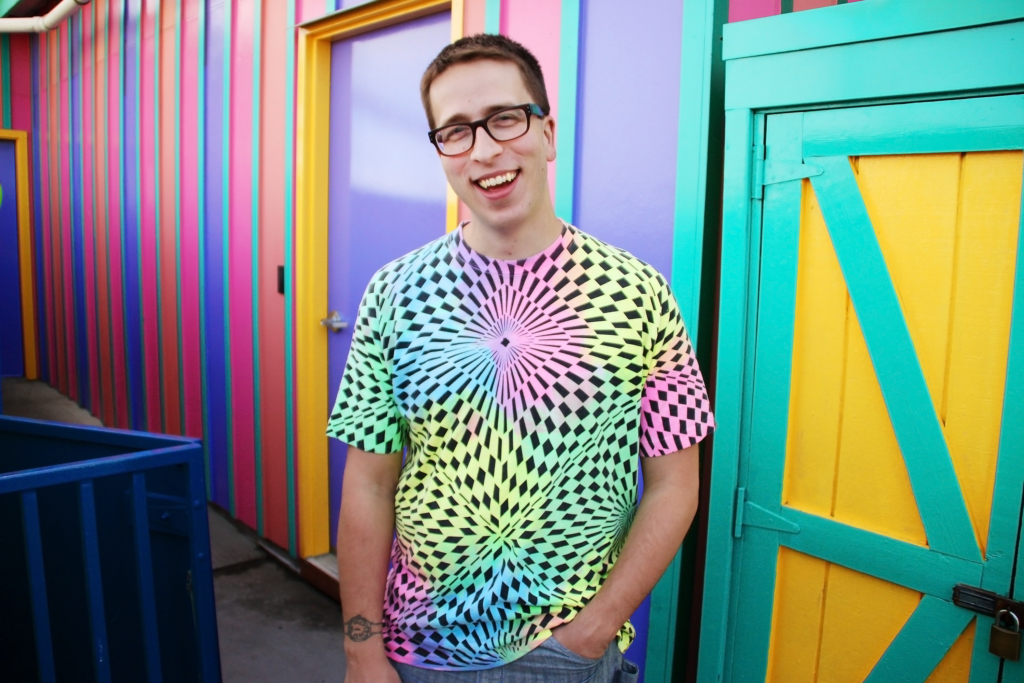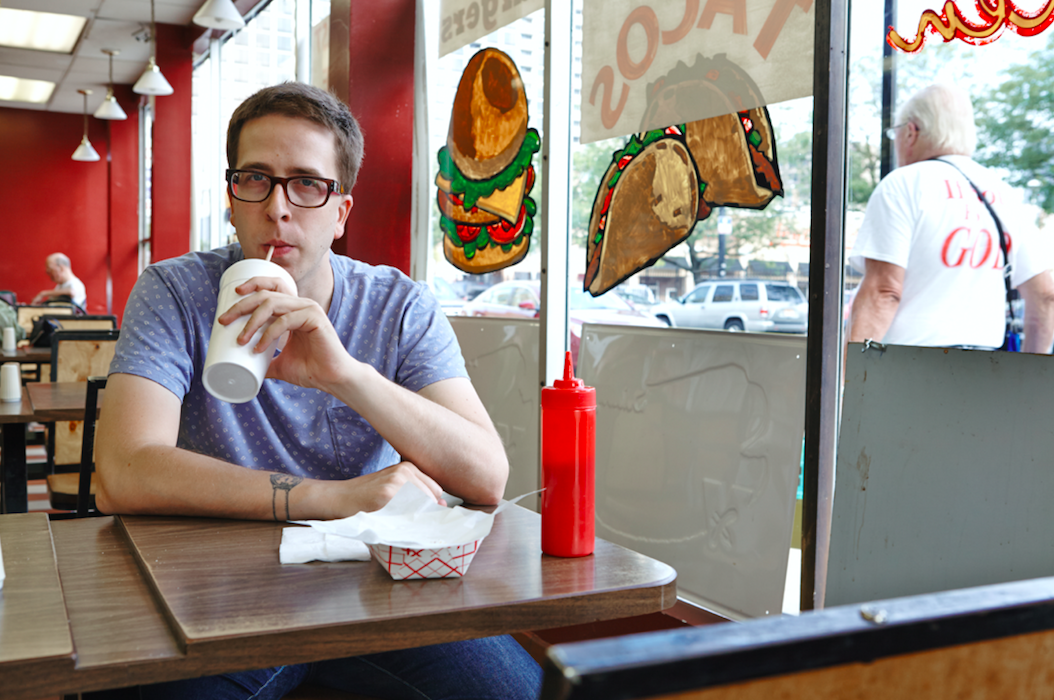Hardcore is slowly but surely infiltrating the music scene on a wider scale again – with plays across mainstream radio, the fashion industry taking inspiration from the free party movement and broadsheet media talking about ‘what clubbing culture used to be’. And as the world goes in to political turmoil, it feels fitting that a genre boosting positivity and optimism makes a welcoming return once and for all.
One producer and DJ who brings that joy to his music and sets is Chrissy, a Chicago finest and ‘one of the best DJs to ever walk the earth’ according to The Black Madonna. Whilst we have yet to see him DJ, a selection of online mixes for the likes of Honey Soundsystem, If-Only and Groove are a true testament to that quote. With a 20-year career in the music industry, Chrissy is a well-regarded voice from running his ‘My Year of Mixtapes’ and ‘My Year Of Edits’ blog and has tapped in to all genres spanning across Chicago house, disco, ghetto house, footwork and jungle. Organising the first international tour of footwork dancers and running the acclaimed juke/footwork label Loose Squares, there’s not many avenues Chrissy hasn’t explored. Now running house music label The Nite Owl Diner and it’s new sister label Cool Ranch, Chrissy has also released on Planet Mu, Hyperboloid, Freerange, Tugboat Edits and Hypercolour.
Chrissy’s new album ‘Resilience’ will be released soon on Rawax’s Chiwax offshoot and is inspired by the early-90s rave records that got him into dance music in the first place. The triple vinyl LP includes collaborations with Maria Amor, Dean Grenier and Carrie Wilds. We spoke to Chrissy about ‘Resilience’, why hardcore will never die, some of the biggest lessons he has learned over the years and what other creative platforms he would like to explore.
Your forthcoming album ‘Resilience’ is filled with classic rave sounds and explores themes of love, positivity, perseverance, acceptance and the fight against cynicism – what is it about the classic rave era that reminds you of those themes?
That was really the overarching tone of the rhetoric back in those days, at least at the raves I was going to. Euphoria, togetherness, community, PLUR, all that. I’ve never really given up on all that naïve, wide-eyed idealism, so right now when the political scene is a miserable apocalyptic hellscape and the “cool” music to like is dark punishing techno, it feels extra-important to try and make people smile.
Why do you think hardcore will never die?
Because there will always be young weirdos trying to have fun and/or piss off their parents
For someone that has never been to Chicago, how would you describe the Midwestern rave scene?
Well it has changed a lot over the years. Back in the ‘90s the rave scene was huge and reached out to all these mid-size cities like Cleveland and Minneapolis and Louisville and Kansas City (where I’m originally from). Today, dance music is more concentrated in the clubs in places like Chicago and Detroit than it used to be, but there’s still a lot of really cool stuff happening all over. There aren’t really big warehouse raves every weekend like there used to be, though.
I have found in London that there are selected parties that allow for artists to play hardcore and old school rave records – what is the scene like in Chicago?
In my experience the UK is more accepting of those sounds than anywhere in America, so I’m surprised to hear you say that! To be honest, I think people are just starting to become interested in those sounds again, so any answer I give is bound to sound outdated in a year or two. I think people are getting sick of hearing the same one or two subgenres all night, and hopefully we’re going to see a lot more diversity of sounds at events in the near future.
You’ve explored so many different genres over the years spanning from disco to footwork to Chicago house and the rest – is there anything else that you would like to experiment with?
I’d love to write more vocal tunes—that’s kind of what I have the most fun doing these days. There are a lot of genres that I love but I haven’t really worked in—soca, dancehall, grime, 2-step, etc., but to be honest I really just try to make whatever I am feeling in the moment and not think about what genre it is until it’s time to release it.
Why did you choose to explore the old school rave era for ‘Resilience’? What makes now the right time for this genre? Do you feel that politics and current affairs influence your productions?
When you think about it, the political environment in the US & UK now is more like the late-’80s / early-’90s than any time since: the conservatives have taken over, spouting all sorts of racism and xenophobia and talk of “law and order” policies and closing down the borders and taking benefits away and massive deregulation, all for the ultimate benefit of rich people who’d rather not pay their fair share of taxes. And just like back then, the dance music scene is becoming more overtly political again in response, and resisting those oppressive forces. So in that sense, the rave era is something that has been on my mind a lot. But on a less thought-through level, I just love those old records and I love those sounds and I wanted to make something in that vein.
What was the process like when making ‘Resilience’? Did you have an idea of the concept before you went into the studio?
Somewhat. I had a lot of rough song ideas that were floating through my head, and realized that I all wanted them to kind of work with a certain palette of sounds that would be reminiscent of that era, so when I sat down to record the ideas that was a big part of my intent. But as with any creative process, a lot of it was kind of worked out as I went along, and a lot of the overarching concept kind of revealed itself as I was writing the tracks, if that makes any sense…
You’ve previously mentioned that some of your favourite productions are the ones with vocals on it, on the album you guest appearances from Carrie Wilds, Maria Amor and Dean Grenier. Why do you prefer the records with vocalists on?
To clarify, Dean Grenier doesn’t sing—he’s another producer who I think is really phenomenal, and the track I did with him is an instrumental. And I do love good instrumental tracks (including that one, and the other ones on the album, which I hope other people like too!)
But there is something about a proper vocal tune, and the meshing of the lyrics with the music, and the way a brain reacts to the human voice, that just does something to me that instrumentals often can’t. It’s not that I like vocal tracks better—perhaps just that I think vocals are a really powerful, emotionally resonant, and criminally underused instrument in dance music. I gravitate towards good vocal tracks, and respond to them in a more visceral way than most instrumentals. The two vocal tunes on this album (featuring, as you mentioned, Maria Amor and Carrie Wilds) are an attempt to capture some of that feeling—hopefully they provoke that same emotional response in other people.
Having been in the music industry for 20 years now, what are some the biggest lessons you’ve learned?
1) Be nice to everybody, even if they really don’t seem like they deserve it. It might end up coming back to you, and even if it doesn’t, it feels better than being mean.
2) Be humble. Even the most talented, most famous, most highly-paid, most globetrottingest DJ still basically sells liquor for a living. I love what I do and I think it’s artistically important, but at the same time I haven’t cured any diseases or walked on the moon or anything, so what right do I have to get all cocky about it, yknow?
3) A lot of people in this industry are fucking SHADY. Be alert, be careful, but don’t let other people’s antics make you bitter or get you down. Holding a grudge is way more effort and anguish than just letting go and finding some better people to hang with.
4) Don’t expect anything. Try not to be mad because so-and-so didn’t book you, or sign your track, or recognize your talent. No matter who you are, some people will get it and some people won’t, and either way you should be focused on doing what YOU like, not what somebody else might like. Dance music doesn’t owe you shit, so either do it because you love it or don’t do it. If you make a little money from it that is a really cool bonus.
How do you stay excited about DJing and producing? Is there anything in particular that you do to stop you from burning out?
I just really, really love music, and love traveling as well, and consider myself incredibly lucky that I get to fly places to play music for people. I don’t need any more convincing than that!
You also run the label Nite Owl Diner, what made you decide to launch a label?
There’s a ton of really good music out there that I wanted to shine a light on, so The Nite Owl Diner grew out of that. I like The Nite Owl Diner as a place that can give some attention to other artists, so I also set up a side label called Cool Ranch that releases things I’ve made.
The artwork is based on the types of diners you would end up at after the rave – what makes these diners such a great inspiration for you and the label?
Just a lot of nights spent at places like that. After the clubs closed (or the warehouse got busted by the cops), there’s always that crew looking for the next thing to do, and a lot of times where I grew up it was a 24-hour diner. To me it just made sense to link the two together.
Which artists would you say are your current influences?
Violet, Strategy, G6 Productions, Garrett David, S3A, Cratebug, Freezy, loads of others…

Do you gather inspiration from anywhere else such as films, technology, architecture, art etc?
I’m very interested in art, architecture, and film, but not sure how much it bleeds into my tracks…
Who are some of your favourite hardcore artists?
SL2, Krome & Time, Acen / DJ DMS / The House Crew / all the Production House guys and their various pseudonyms, 4 Hero / Manix / Reinforced Records, DJ Vibes & Wishdokta, DJ Seduction, and Mark Archer / Altern-8 all come to mind.
Are there any other creative platforms you would like to explore?
I’d love to write a book someday.
What do you aim to achieve as an artist?
Having fun and sharing sounds I like with other people. Hopefully making somebody else’s day a little nicer.
‘Resilience’ by Chrissy is being released in three parts with the first available soon via Chiwax – pre-order here
